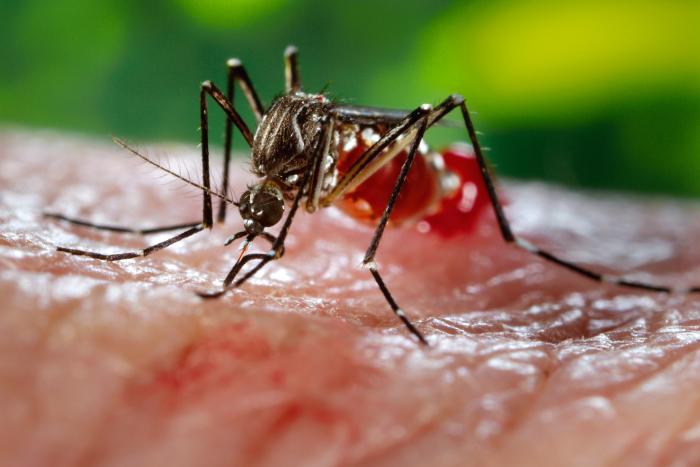Dengue fever on Big Island: 19 cases and counting
In a follow-up to the continuing coverage of the outbreak of autochthonous, or locally-acquired dengue fever on the Big Island of Hawaii, the Hawaii Department of Health (HDOH) reported an additional four cases yesterday, bringing the outbreak total to 19.

Female Aedes aegypti mosquito
Image/James Gathany
Local transmission means that mosquitoes in the area have been infected with dengue and are spreading it to people.
Health officials say of the 19 locally acquired cases, 12 are in Hawaii residents, while 7 are in visitors. Two pediatric cases have also been confirmed.
The HDOH has advised physicians and other health care providers to be aware of dengue and other mosquito-borne infections when patients present with compatible findings (i.e., fever, myalgias/arthralgias, rash, AND exposure to or bites from mosquitoes without alternative underlying etiology.
In addition, all such cases must be reported to the health department when first suspected. This will assist in identifying and abating potential areas of mosquito transmission and places that may put the public’s health at risk. Dengue fever is an URGENT CATEGORY NOTIFIABLE CONDITION and must be reported by phone.
Dengue fever presents 5–7 (range 3–10) days after a bit by an infected mosquito. Symptoms include high fever, arthralgias, myalgias, severe headache, retro-orbital eye pain, maculopapular rash, and mild hemorrhagic manifestations (e.g., petechiae). Mild cases may have only a nonspecific febrile syndrome. Uncomplicated dengue fever resolves within 2–7 days. In some, symptoms can progress to severe dengue, which can be fatel and present after initial fevers resolve. Hemorrhage and extensive plasma leakage, requiring critical, aggressive supportive care and monitoring, are characteristic. Early laboratory values in dengue fever typically demonstrate leukopenia and thrombocytopenia; patients with severe dengue can have an abruptly increased hematocrit.
Treatment for dengue infection is supportive; patients should be monitored for potential progression to severe dengue.
Individuals suspected or confirmed to have dengue fever should be instructed to stay indoors and avoid mosquito bites during their first week of illness (i.e., especially while febrile). Patients should be encouraged to aggressively control and eliminate mosquitoes around their homes and businesses by eliminating areas of standing water. Windows and door screens should be checked for holes/tears and repaired. Individuals should use mosquito repellents containing 20–30% DEET and wear long sleeves and pants when possible.
Robert Herriman is a microbiologist and the Editor-in-Chief of Outbreak News Today and the Executive Editor of The Global Dispatch
Follow @bactiman63
Related:
- What is dengue fever?
- California man, Luis Ortiz, survives tapeworm in the brain
- Gonorrhea: Increased prevalence of reduced cefixime susceptibility in 2014














